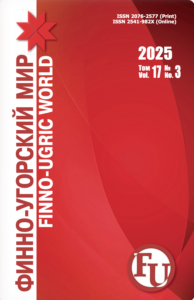PHILOLOGY
L. A. Abukaeva (Yoshkar-Ola, Russia). The concept jylme ‘language’ in the language and ordinary world views of Mari
V. B. Bakula (Murmansk, Russia). Problems of formation of literary language of the Kola Saami
E. A. Kartushina (Moscow, Russia). Pragmatic Reality of Finglish (in Twitter Social Network)
F. M. Lelkhova (Khanty-Mansiysk, Russia). Derivational structure of disease names in the Khanty language
A. S. Migunova (Kochkurovo, Russia). Derivational means of expressing locativity in the Erzya and Finnish languages
E. N. Morozova (Yoshkar-Ola, Russia). Research methods and techniques of the phraseological stock studies in the Mari language
M. V. Mosin, N. M. Mosina (Saransk, Russia). Features of the evolution of the vowels of the first syllable of Finno-Ugric stem in the Mordovian languages
E. N. Muhina, T. N. Potapova (Kovylkino, Russia). The location of the adverbial modifier in the modern Erzya and Finnish languages
HISTORICAL STUDIES
A. K. Gagieva (Syktyvkar, Russia). Public charity as the activity of Ust-Sysolsk “local community” in the second half of XIX century
O. I. Kulagin (Petrozavodsk, Russia). Timber industrial complex as an instrument of interaction of the state and the Finno-Ugric region: in search of new research approaches
V. V. Kozin, T. I. Kirdiashkina (Saransk, Russia). Attendance monitoring of ethnic tourism objects in the Republic of Mordovia in 2017
CULTURAL STUDIES
N. I. Boiarkin (Saransk, Russia). Mikhail Aleksandrovich Lobanov: serving the science
E. M. Kolcheva (Yoshkar-Ola, Russia). Landscape field/meadow archetype in the Mari art of the 1950s–1980s
EVENTS, PEOPLE, BOOKS
N. I. Fabrichnova (Ichalki, Russia). Dialogue of cultures took place!






















